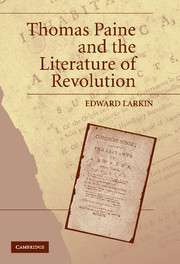Book contents
- Frontmatter
- Contents
- Acknowledgments
- Introduction
- 1 Inventing an American Public: The Pennsylvania Magazine and Revolutionary American Political Discourse
- 2 “Could the Wolf Bleat Like the Lamb”: Paine's Critique of the Early American Public Sphere
- 3 Writing Revolutionary History
- 4 The Science of Revolution: Technological Metaphors and Scientific Methodology in Rights of Man and The Age of Reason
- 5 “Strong Friends and Violent Enemies”: The Historical Construction of Thomas Paine through the Nineteenth Century
- Epilogue: Paine and Nineteenth-Century American Literary History
- Works Cited
- Index
Epilogue: Paine and Nineteenth-Century American Literary History
Published online by Cambridge University Press: 25 July 2009
- Frontmatter
- Contents
- Acknowledgments
- Introduction
- 1 Inventing an American Public: The Pennsylvania Magazine and Revolutionary American Political Discourse
- 2 “Could the Wolf Bleat Like the Lamb”: Paine's Critique of the Early American Public Sphere
- 3 Writing Revolutionary History
- 4 The Science of Revolution: Technological Metaphors and Scientific Methodology in Rights of Man and The Age of Reason
- 5 “Strong Friends and Violent Enemies”: The Historical Construction of Thomas Paine through the Nineteenth Century
- Epilogue: Paine and Nineteenth-Century American Literary History
- Works Cited
- Index
Summary
His Paine story amounted to a resurrection of Paine out of the horrible calumnies, infamies, under which orthodox hatred had buried him.
Walt Whitman, 1789In one of the most curious cameo roles in early American literature, Royall Tyler includes an encounter with Thomas Paine in his 1797 novel, The Algerine Captive. Updike Underhill, the hero of Tyler's bizarre but fascinating text, first meets Benjamin Franklin and then Thomas Paine during his travels in London. Given his strong Federalist politics, Tyler's representation of Paine is, not surprisingly, unflattering. However, Paine's inclusion reflects the extent to which he was still a voice to be reckoned with. Indeed, in the 1790s Paine was one of the most recognizable characters in the West, well known in the United States, Great Britain, and France. At the height of his fame in the last decade of the eighteenth century, Paine was frequently satirized by James Gillray and other cartoonists of the age for whom he served as a symbol of the twin evils of republican ideology and rational religion. Tyler disdains almost everything about Paine. When Underhill first meets Paine he is introduced as “the most singular curiosity, I saw in London,” who is the author of several texts “whose tendency is to overturn ancient opinions of government and religion” (87). The strategy of Tyler's account of Paine, already evident in these passages, is to marvel at Paine's celebrity and, at the same time, wonder about its legitimacy.
- Type
- Chapter
- Information
- Thomas Paine and the Literature of Revolution , pp. 179 - 194Publisher: Cambridge University PressPrint publication year: 2005



